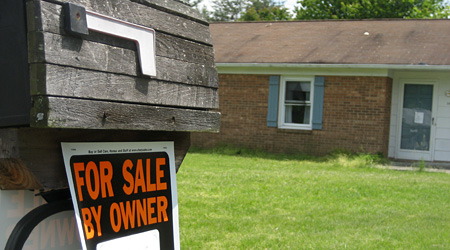How To Determine Property Value

Determining the property value of a home is part art and part science. The science part compares similar homes on the market by examining such factors as final sale price and geographic location. The art part of the equation is more subjective and evaluates current trends in housing as well as whether or not it's a buyer or seller's market. You don't have to be an expert to determine property value but sometimes it can help to enlist the assistance of a licensed and experienced realtor when you want to establish your homes property value.
The Internet has become an invaluable tool when laying the initial groundwork for determining property value because now you can find comparable properties with similar square footage and layout within a few minutes. A simple search for homes with four-bedrooms and 2 1/2 baths comprising 2200 sq. ft. in a given ZIP code will give you a great starting point when determining property value. Of course, no one should price their home based on this initial data as there are many more considerations which affect property value. This does however eliminate a big part of the guessing game and give you some important information when you start digging deeper into the details and before finally consulting with a realtor.
Once you narrow down your search to a half-dozen or so houses which are comparable to your own then start examining the additional features of those properties. Do they have finished landscaping? Are there upgraded cabinets or hardwood flooring? Did the current homeowner add a hot tub or pool to the backyard? Is there radiant floor heating or other energy-efficient features? All of this information will be listed in the property details which will help explain any variance in pricing and may help adjust your own property value up or down. This initial estimation of property value is a good starting point for the next step which is speaking with a licensed real estate professional.
Realtors have additional tools available via the Multiple Listing Service that average home buyers normally do not have access to. Two key pieces of information which can significantly affect determining property value are the time on the market and final sale price. It is one thing to look at online listings and see a house similar to yours with a high sale price and get excited. The fact that a property owner is charging a premium price doesn't actually translate to it selling for a premium price. It is common knowledge in any market where there's negotiation that the seller of a product prices it above market knowing that the price will be lowered by 5% to 10% as part of a negotiating tactic. A cruel irony in real estate is that even though homes traditionally appreciate in value over time the longer a home is on the market for sale the lower the final sale price will be. As listings become stale and hit 180 days or more on the market the negotiating position of the seller becomes less prominent and buyers will often make counteroffers significantly below the asking price. The perception is that if the property was as good as is claimed it would've already sold within the first few weeks of being on the market.
Realtors, in addition to various tools like the Multiple Listing Service also known as the MLS, often have many years of experience which become invaluable in evaluating overall market trends and in presenting a property in its best light. A good realtor may be able to get a few more percentage points on a sale with proper marketing and a good sales pitch. Potential home buyers sometimes don't know exactly what they want and successful real estate agents are able to hone in on these insights and close the sale. Home sales are also driven by seasonality which means more homes are sold in the spring and less homes are sold in winter. It doesn't seem to make sense that a property should fetch more or less during the sale simply because it's warmer or colder outside but this is the psychology of real estate markets.
How to determine property value includes various factors such as an objective analysis of fact-based data like final sale price and a property's physical characteristics but also a little bit of subjectivity. Human beings buy and sell real estate not machines and therefore quirks and idiosyncrasies can affect perception and valuation. If you don't take into consideration presentation, seasonality and skillful negotiation then it is possible that a house may never sell or if it does it could be for significantly less than its true market value. A highly skilled and experienced real estate professional brings more to the table than just putting up some flyers, making the sale and collecting 3%. Determining property value is a multifaceted process which if done properly will maximize potential gains and minimize potential losses.







